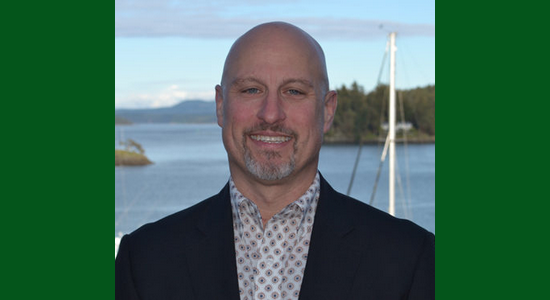— by Joe Symons —
As I sit waiting for my ferry, I notice the white lines marking the lanes. Why were they painted? Surely to help guide the traffic, to provide an orderly means to establish the first come, first serve rule which silently regulates the cultural understanding of access to almost everything these days: movie lines, grocery store lines, drivers license renewal lines, phone calls to just about any organization (“your call will be taken in the order it was received.”)
Who authorized the painting of the lines? Some faceless bureaucrat approving a purchase order for 50,000 gallons of white striping paint to be distributed among the Washington State Ferry System maintenance department supply lockers? Are the painted lines on the pavement the result of ‘regulations’? Would there be lines if there were no regulations? Would it matter if there were no lines?
There seems to be a strong opposition to ‘regulations’ these days, as if regulations and the regulators who establish them were some evil force that has to be contained if not eradicated. On the other hand, some will argue that regulations are inadequate. It depends on what is being regulated. Thus when several children died from contaminated meat a few years ago, many people called for tighter meat inspections, that is, more regulations on the meat processing industry.
The fact of my life is that I’m steeped in regulations like a tea bag left in a cup of hot water for a week. It’s not just the ferry parking lot lines: every road has lines, and personally I’m glad for them. Of course there are stop signs, and road signs, all of which have a regulation size and readability, and I’m glad that no matter where I drive in America I don’t have to figure out the basic rules of the road. I can get on with my life, get on to my destination, without having to re-invent and re-discover how to do something because I’m in a new venue. There are regulations which affect telephones, so I can dial the same way anywhere in the country; regulations which affect voltage in the walls, so I can safely and efficiently use any electrical appliance anywhere. There are so many regulations which make my life easier, I should welcome them gladly: I certainly would be amazed at what a hassle life would be if they all disappeared overnight. Yet I don’t look for ways to encourage my political representatives to spend my tax money on regulating even more behavior. I wish the world were such that regulations weren’t so necessary.
So why indeed do we have so many regulations, in so many areas? Is it the price of being so big, so much in demand? Clearly if few called about computer problems you could get right through to a technician without being on hold. If few needed to renew their driver’s license you could walk right in and be served immediately. If no one wanted to see a movie you’d have the theater to yourself and wouldn’t have to get there early in order to get a good seat, or in many cases, a seat at all. So bigness leads to some sort of fair, orderly control, and first come, first served seems fair: if we design regulations to enforce that, who’s fault is that? Big bad government? It’s us.
Of course, another reason we have regulations is to deal with the fairly widespread issue that many people don’t have an inclination to “do the right thing.” How many would pay their taxes by April 15th if there were no penalty? How many would pay them at all? How many would stop completely at every stop sign? Why inspect meat? Let the buyer beware. Why recall cars? If they blow up when hit, hey, it’s everyone for himself. Why have metal detectors in airports? If the plane is hijacked, well, sometimes that happens. Some regulations deal with the few who would disturb the many. Some regulations deal with the many who don’t really want to do something they ‘should’ (like pay taxes, drive safely, put their garbage cans on the street). These types of regulations deal with “third party” effects, where basically innocent people get caught up in someone else’s dumb, or bad, behavior (dumb if they litter, bad if they hijack a plane). What are you going to do? Shoot ’em? Get serious. The choice is do nothing or make regulations.
As the population of a place rises, regulations are stimulated for both the reasons presented above: the place is bigger, so a more formal order is required to guide people, and because there are more people, there are more of those who would do dumb, and bad, things, impacting the rest of us. For example, if the average number of automobile accidents per year is a function of the number of passenger miles driven, then if there are more people on the road, there’s going to be more accidents. It doesn’t take a rocket scientist to figure that one out. Similarly, if there is an average rate of, say, one felonious assault per 10,000 people per year, then if the area grows from 4000 people to 12,000 people, there are going to be more violent crimes, and then there are going to be more regulations, more police, etc.
Land use regulations are really no different, and are stimulated for the same two reasons: guiding a limited resource and protecting the innocent. If my neighbor is five miles away, I don’t care if he has chickens or a bed and breakfast. He is too far away to disturb me. If he’s next door, however, I might be very concerned about the smells, or sounds, or traffic, or, broadly, intrusions on my peace, my air, my land from his (or her) activity. If he (or a lot of ‘hims’) sucks enough water out of the ground, my well may grow dry. If he builds a high building, I might lose my view. If he drains his ‘swamp’, I might lose the birds and wildlife which used to roam my property and remind me of why I moved to a rural spot in the first place.
To argue for less regulations while the population grows is to reveal a fundamental misunderstanding of how a society works, and will inevitably prove to be futile. Something will come along to implement a regulation to solve the bigness problem and, later, the ‘badness’ problem. To argue that people should be ‘free’ to do what they want will result in the kind of freedom permitted by white lines in ferry terminal areas and metal detectors in airports. Why? Because there will always be a response when disruption exceeds the tolerance level of the system. To not respond would indicate a system plunging into chaos. Imagine whether you would be indifferent if there were no response to the Charlottesville violence; can you imagine anyone saying “Well, sometimes that happens…you can’t do anything about it…you shouldn’t even try.”
If you really want to keep the freedom you’ve got nowfrom additional regulations, keep the population small, and smart. Smart is important: a cancer cell is ‘free’ to grow and has no regulations, but since the cell doesn’t pay attention to the consequences of its collective behavior it will kill the host. That’s suicide. Whoops!
Pay attention! you might say, Watch Out! But wait: who are you rooting for? The cancer cell? Is that the embodiment of “independence, privacy and personal freedom”, qualities held up by some as oppositional to regulation? No one is independent enough in our society to yell “fire” in a movie theater, private enough to be able to abuse a child at home, personally free enough to build a home without a building permit.
The point is not whether regulations will come; the point is who will be in charge of selecting them. You can either make them now, while you are small (and smart), when you can choose the scale of the system (and thus the problem set) within which you’ll operate, or make them later, under the requirements of a bigger system, where your choices will be more expensive, frequently imposed from the outside, and mandated by an unavoidable response to the bigness and badness problems.
Thus, the real question is whether we can craft regulations together in a consensus mode or whether we’ll see each other in the chambers of the Supreme Court. I hope we can work together as a community in a consensus, rather than a confrontational, mode, crafting a mutually-agreed upon set of policies which minimize the need for rules required by the problems inherent in a bigger system.
Since the number and severity of regulations is a direct function of population size, to keep taxes and the government as small as possible, implement the phrase “small is beautiful.” Aside from keeping taxes and government smaller than it would otherwise get, we get an even greater benefit: a smaller, more peaceful community where the private and public intersection points are smaller, more intimate, more personal. The result is less system responses, like helpful white lines (or mandatory jail cells), and more human scale responses (precisely because there’s plenty to go around) like “My! Isn’t this place beautiful!”
(Author’s note: this commentary was originally written in 1995. Since then the population of San Juan County has increased by 1/3. As noted in a reader comment regarding the propane tank proposal, it is population growth that stimulates, if not requires, new infrastructure. The existing comprehensive plan has a buildout population several times our current population. The path to staying small and smart begins at KeepSanJuansWild.org )
**If you are reading theOrcasonian for free, thank your fellow islanders. If you would like to support theOrcasonian CLICK HERE to set your modestly-priced, voluntary subscription. Otherwise, no worries; we’re happy to share with you.**








I read for a long time, and my final thought was “huh?”
The flip side of regulation and societal order is/are the freedoms we enjoy as Americans. One undefined freedom is the ability to move and live throughout this huge country almost without restriction. The population of Orcas has grown, during the 43 years that I have lived here, from 2500 hardy souls to about 6000.
Without order and structure, and regulation, the island that we all love would be a potpourri of conflict. The hog rendering plant would be on the neighboring property to your elegant house. That having been said, I am thankful that I live on a remote island rather than suburban Philadelphia from whence I came. I hope, then, that our need for regulation can be moderated to the minimum. We need not be so structured that we all live in green houses and all drive red pickups.
I am not a fan of intrusive government, however, I fully understand the need to have white lines in the ferry lot to guide us through an increasingly complex society.